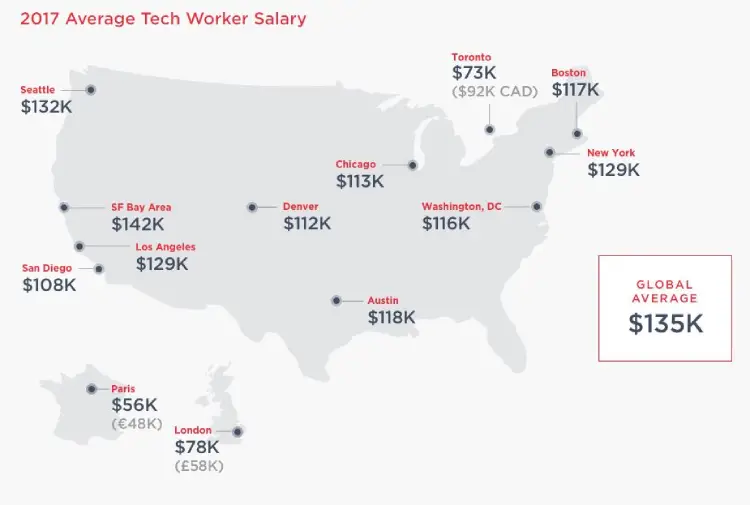
Salary is often a sticking point for the tech ace, with many left asking if a move abroad is worth some extra pocket money.
While Britain is a global hub of start-up innovation, world-class research and unparalleled fintech, a tech role in certain US cities could line the pockets a lot more than it does Europe. Stacks more, according to a study from Hired. In the past 12 months, tech salaries grew 5% in San Francisco and New York. In the UK, equivalent employees banked just 1.24% more – lower than the 2.8% rate of inflation – so actually saw pay packets shrink in 2017.
Tech workers in London actually earn 42% less than counterparts in San Francisco (adjusting for cost of living), who earn $142k (£102,500) on average. By contrast, a computer-savvy jobseeker can expect £58,000 a year in the UK. This is higher than in France, $56k (£40,400) though Brit earnings have dipped a worrying 17% since 2015, researchers found.
To add insult to injury, the findings back up a separate study which found UK IT staff had the worst work/life balance compared with equivalent workers in Australia and the US.
Brexit has slightly staunched the flow of foreign workers into Britain, with the nation seeing a 7% decline in overseas hires last year. To compensate, companies are offering inflated salaries to foreign hires, to the tune of £12,000 more than local UK candidates.

The report also looked at the average salary for a tech worker in various industries, and, surprisingly, discovered financial services earned the least: $111k (£80,100) annually. Transportation paid the highest average salary: $145k (£104,700), followed by education: $135k (£97,400), communications: $133k (£96,000), then retail $126k (£90,900).
Product managers are the best paid in tech, at $145k (£104,700) p/a though tech salaries in data analytics, product management, design and software engineering have all steadily increased since 2015.
Women to be hit hardest in first waves of automation – PwC
What robot uprising? UK cities no more at risk of automation than 100yrs ago
Computer programming is fast becoming the next ‘second language’ to learn, but with so many languages to choose from it can be hard to know where to set the focus. JavaScript, Java, Python, HTML and CSS were the top five most sought-after skills, according to the data.
When it comes to tech specialisms, the options are almost as numerous as moves in a game of Go. But in 2018, the Full Stack Engineer is the position companies most frequently want filled, followed by Backend Engineer, Frontend Engineer, DevOps Engineer and Mobile Engineer.
Hired.com produced their 2018 report based on proprietary data from 69,000 job seekers on their San Francisco-based web platform, in addition to survey responses from 700 tech workers on Hired.com.






